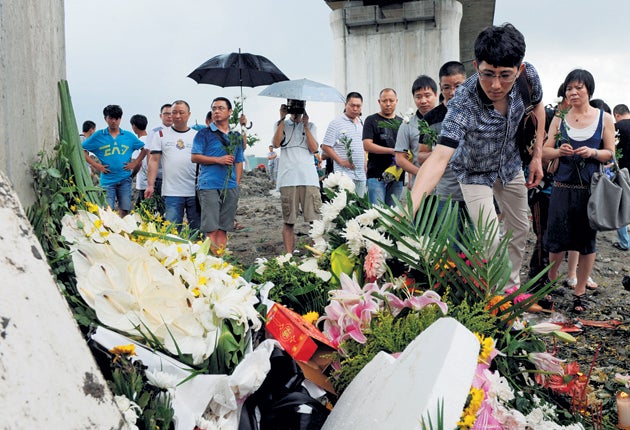China's media makes rare show of defiance after rail crash cover-up

Leading chinese newspapers have criticised the official handling of a fatal bullet-train crash, in an unprecedented act of defiance of a government ban on negative coverage of the disaster.
The Communist Party on Friday ordered newspapers to avoid all mention of the crash on 23 July that killed 40 people, except for "positive news or information released by the authorities", after the country's leadership was slated for its attempts to cover up the disaster. The edict forced some newspapers to tear up their coverage and replace it with cartoons and unrelated stories.
But in a sign of the increasing failure of central control – and reflecting a sense of outrage that has swept online forums – prominent newspapers yesterday risked censure to ignore the edict and run stories that raised safety fears over China's swift industrialisation.
The Economic Observer, a highly respected business weekly, published an eight-page special on the crash, featuring a bleak photograph of the wrecked train overlain with a blood-red logo of the Railways Ministry. The headline – "No miracles in Wenzhou" – referred to the discovery of a two-year-old child in the wreckage, 21 hours after the accident which killed the parents and after the rescue effort had been called off. A ministry official had described the rescue as a "miracle".
Other coverage carefully disguised its critical tone. The Beijing News ran a story on its front page about the breakage at the Palace Museum in Beijing of a piece of pottery from the Song Dynasty. Its coded message was clear: the bowl broke into six pieces – six train carriages were derailed in Wenzhou in China's worst rail accident – and the museum accident happened because data was incorrectly entered by a technician. The Palace Museum was "very distressed" by the incident – and denied a cover-up after the news was announced days late.
The report ran above a photograph headlined "China's Speed", which shows Chinese swimmer Sun Yuan breaking the world record at the World Championships in Shanghai, but which could also be read as a comment on the high- speed rail obsession at government level.
The ban on negative coverage came after Premier Wen Jiabao visited Wenzhou to pledge transparency and openness, promising to punish those responsible. The Propaganda Ministry issued a statement to the media banning coverage, but the online anger and media criticism continue.
"The party's information management system is broken," said Kerry Brown, head of the Asia Programme at Chatham House, the international affairs think-tank. "In an era of revolution in information technology, we are seeing a central state strategy that has fallen by the wayside."
There were similar outpourings of anger after events such as the poisoning of infant milk formula in 2008, but this time the outrage is being vented on the popular Weibo microblog service, where the rail crash was the top trending story.
Normally cowed by censors, the media has been voracious in its criticism of the government response. The crash dominated the front pages last week, with much of the coverage of strongly critical of the government's attempts to boost economic advance at all costs, including those of consumer safety.
Even the ruling Communist Party's official organ, the People's Daily, said China did not need GDP growth that was smeared with blood.
Challenges to the party
The Economic Observer occupies the role of the Financial Times in China, a weighty paper with a business-bent.
For it to focus so closely on the Wenzhou high-speed rail disaster – the section inside featured a train ticket stained with blood – is a sign of how deeply this event has unsettled people in China.
On the bottom of its front page yesterday was an editorial written in the form of a letter to Xiang Weiyi, the two-year-old girl who was discovered in the wreckage. "Yiyi, when you grow up, will we and this country we live in be able to honestly tell you about all the love and suffering, anger and doubts around us?" it said.
The Beijing News is the most popular daily in the capital, playing a similar role to the London Evening Standard. When it runs a story on a broken piece of Song Dynasty pottery, readers are going to be aware that the story has a hidden meaning.
While some commentators took a risk, most newspapers chose to tone down their coverage.
The English- language China Daily ran an editorial saying it was necessary to "plug any loopholes" in the development of high-speed rail, but that Chinese technological quality was basically sound.
Join our commenting forum
Join thought-provoking conversations, follow other Independent readers and see their replies
Comments
Bookmark popover
Removed from bookmarks